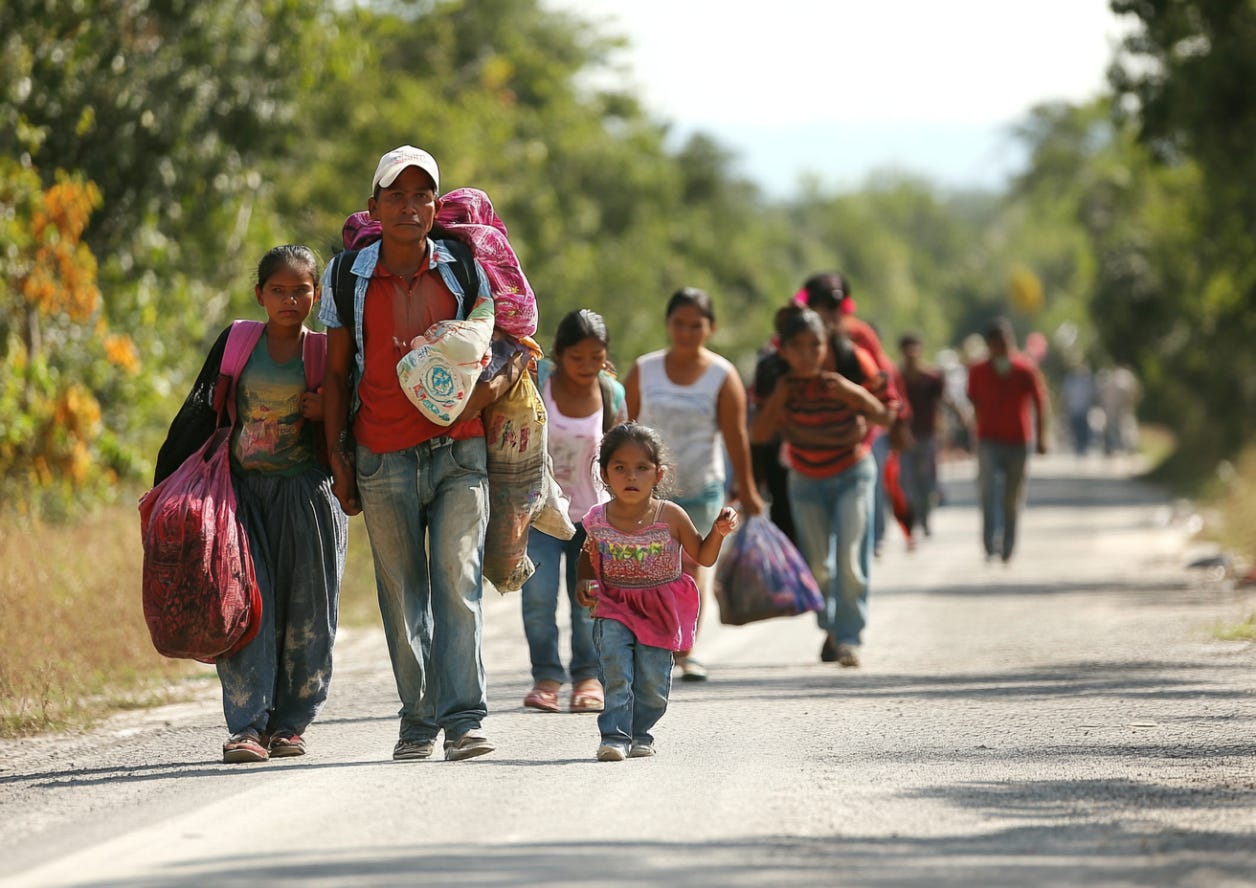
The Flying Frisby - money, markets and more
Business:Investing

The Truth About Immigration - And Where It's Going
 2024-08-11
2024-08-11
To watch this piece, go to:
1. There are more people in the world than ever - and we all want better lives
There are some 8.2 billion people in the world - more than ever - and, whether it’s people displaced by war, famine, or lack of water, or (the big one) people seeking a better life with more opportunity, more us are on the move than ever.
Some stats:
4.6 billion live on less than $10/day.
7 billion live on less than $40/day. 7 billion!
While the number of people in extreme poverty (below $2.15/day) has capitulated in South Asia, East Asia, and the Pacific, it is rising in sub-Saharan Africa.
I was interested to know what the global population by ethnicity is (search engines do not make that easy to find out), but, broadly speaking, it looks something like this (obviously there are lots of mixed race people):
* Asian (Chinese, Japanese, Korean, etc.): ~3.2 billion / 43%
* Indian (India, Pakistan, Bangladesh, Nepal, Sri Lanka): ~1.5 billion / 20%
* Black African: ~1.4 billion / 19%
* White European: ~750 million / 10%
* Middle Eastern (Arab, Persian, Kurd, Turk, etc.): ~500 million / 7%
* Amerindian (North and South America): ~100 million / 1%
* Pacific Islander: ~12.5 million / 0.2%
Visualised:
Though this is rapidly changing with Asian growth, the majority of the world’s wealth lies in the predominantly white (for the time being) countries of Western Europe and North America.
There are a gazillion different reasons put forward as to why this might be, which differ according to worldview, ranging from slavery to IQ to system of rule. Regardless of what the reason is, Western Europe and North America have become the prime destinations for migrants. That is where the money is.
Language is a huge and overlooked factor too. Most people around the world speak some English. If the migrant speaks German, they might prefer Germany, but English is more widespread, and that means greater numbers will favour the Anglo-Saxon nations.
But the population of Western Europe is less than 200 million, 265 million if you include the UK. The population of the U.S. is 345 million. We are tiny in the global context.
The difference in the weight of numbers is staggering.
(Another good stat for you: more people are born in Nigeria each year than in all of Europe).
2. Modern transportation
Because of planes, trains, and automobiles, not to mention boats (fossil fuels and engines, basically), people are able to travel further and faster than ever before.
Forget Around the World in 80 Days, itself a miracle in 1872 when the Jules Verne story was published, now, it’s almost (not quite) possible to get around the world in 24 hours.
Meanwhile, the days of the medieval serf, who was tied to his land and not allowed to travel, are long gone (for the most part—there are bits of Africa and Asia where you are still tied).
3. Modern media
Media and communication are more advanced than ever. Whether it’s TV, film, or, most crucially, social media, the whole world is able to see how the other half lives.
As of 2023, there are approximately 6.8 billion smartphone users worldwide, representing about 85% of the global population.
This has increased awareness of better lives to be had, and it has stoked desire.
Modern communication has also enabled travellers to exchange information on how to move.
So you have:
* more people than ever
* better transport than ever
* more awareness than ever
* more desire than ever.
That is why the mass movement of people is now at levels never before seen in history. That is also why it is only going to increase.
This is a point that nobody in a position of influence in the media or politics seems to be making. Global migration levels are not going down. They are going up.
So instead of brushing the issue under the carpet and calling people racist, immigration is a conversation we need to be having.
What is the plan in the face of migration levels that are inevitably going to increase?
Do we want more people? Fewer people? More of certain types of people?
What is the optimum number of people? Who are the optimum people?
People with certain qualifications? People from certain cultures—Judeo-Christian/Muslim/Buddhist/Hindu? People of certain ethnicities? Must they pass wealth tests, skills tests, IQ tests, values tests? What?
How can this all be agreed? By referendum? By poll?
And once agreed (fat chance), how can it all be ensured?
Spoiler: it won’t be. We are not even going to properly talk about, let alone do anything. At least not until it’s too late (if it isn’t already).
Instead, we will see the further South Africanisation of everything, and yet more internal division while these issues of immigration continue unaddressed.
If you are young, I really wouldn’t hang about. There is a whole world out there. I’d go and be a migrant yourself.
Until next time,
Dominic
Looking to buy gold in these uncertain times? Then check out my recent report, and look no further than my recommended bullion dealer, the Pure Gold Company. Premiums are low, quality of service is high, and you get to deal with a human being who knows their stuff.
On the subject of the recent protests, you might find this of interest: why I think they will achieve very little:
Finally, Charlie Morris is one of my closest mates and he writes what I think is one of the best investment newsletters out there, in fact a suite of them. I urge you to sign up for a free trial.
This is a public episode. If you’d like to discuss this with other subscribers or get access to bonus episodes, visit www.theflyingfrisby.com/subscribe
More Episodes
 2024-01-07
2024-01-07
 2023-12-30
2023-12-30
 2023-12-17
2023-12-17
 2023-12-14
2023-12-14
 2023-12-10
2023-12-10
 2023-12-05
2023-12-05
 2023-12-05
2023-12-05
 2023-12-03
2023-12-03
 2023-11-28
2023-11-28
 2023-11-26
2023-11-26
 2023-11-08
2023-11-08
 2023-11-04
2023-11-04
 2023-10-31
2023-10-31
 2023-10-11
2023-10-11
 2023-09-22
2023-09-22
Create your
podcast in
minutes
- Full-featured podcast site
- Unlimited storage and bandwidth
- Comprehensive podcast stats
- Distribute to Apple Podcasts, Spotify, and more
- Make money with your podcast
It is Free
- Privacy Policy
- Cookie Policy
- Terms of Use
- Consent Preferences
- Copyright © 2015-2024 Podbean.com




